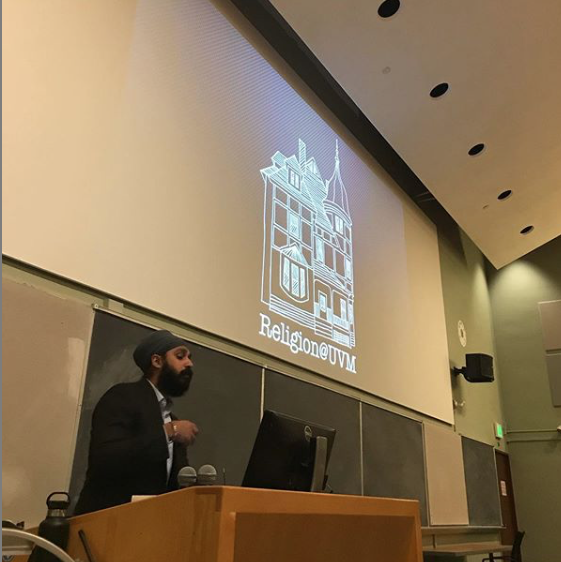On September 26th, Dr. Simran Jeet Singh joined us at UVM to discuss religious literacy. Dr. Singh’s talk entitled “Turbans, Beards, and Hate: How Experiencing Racism Made Me a Scholar Activist” was enriched with deeply personal experiences of racial profiling, institutional racism, and sprinkles of dad humor.

As a Sikh, activism was brought into Dr. Singh’s life at a young age. After experiencing racist remarks as an elementary school student in southern Texas, his parents –who were immigrants from India- had decided to do a workshop with fellow parents at the school. They brought homemade food and discussed their cultural background, which was obviously a lot different than his white classmates.
He states that for his parents this workshop wasn’t about education, but survival. This is where Dr. Singh’s thesis, which he stated multiple times throughout his talk comes into play, “For people on the margins, religious literacy is a matter of survival.” Dr. Singh emphasized how you cannot always control how people treat you, but you can control how you respond to they way you are treated.
After 9/11, Dr. Singh and his family had faced a new reality. Because they wore turbans, they were hyper visible to the rest of the world, but yet as Sikh’s, they were completely unseen. After continuous racial profiling after 9/11, Dr. Singh states that, “it didn’t matter how they saw themselves, but how other people saw them.” Sikhism is the 5th largest religion, but most Americans cannot recognize what Sikhism is, or what the people who practice it look like. With the lack of proper understanding of religious literacy in America, a lot of harm can be done, whether it is intentional or not.
To Dr. Singh, activism is all about the power of community. Upon my reflection of this, a religious literacy activist has a commitment to social justice through both the study of religion in academic settings, while maintaining moral responsibility for said religious communities.
So, why is religious literacy important? It gives us the opportunity to change people’s perspectives, which for some, is an incredibly meaningful experience to have.
As a student currently studying religion, religious literacy, awareness, and advocacy work is really important to me. At the same time, it is important to note that intellectual interest in religious literacy, especially for a white university student like me, is a position of privilege that marginalized people may not have or even have the option to have.
When I think about my position, I question how I can return my privilege in a way that is both helpful and respectful, while at the same time not overstepping any boundaries. As religious literacy advocates, we need to create a community that demonstrates activism and raises the voices of marginalized people and their beliefs.
